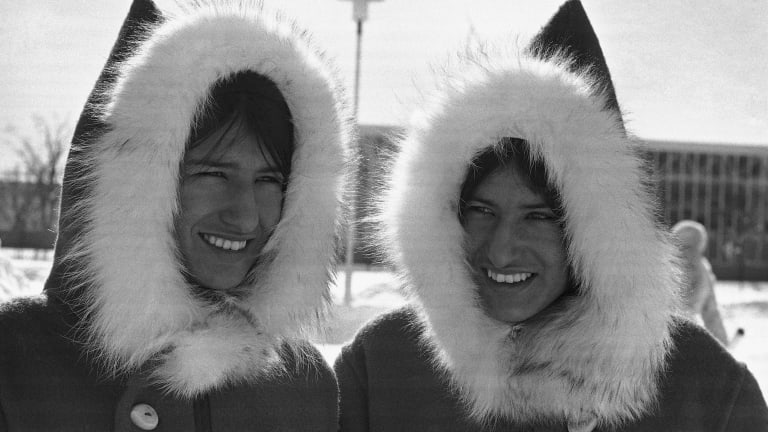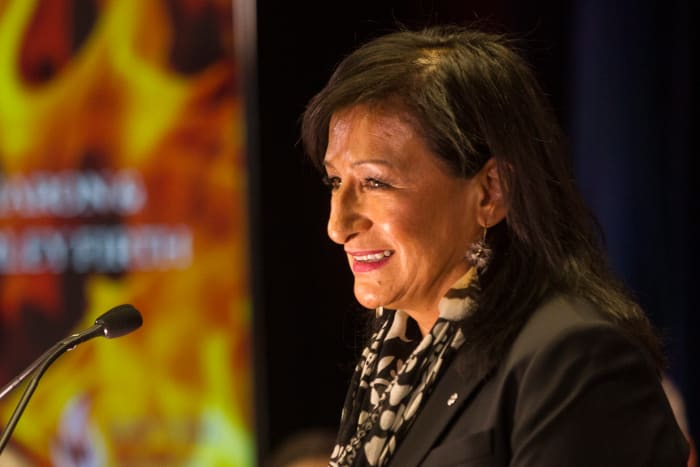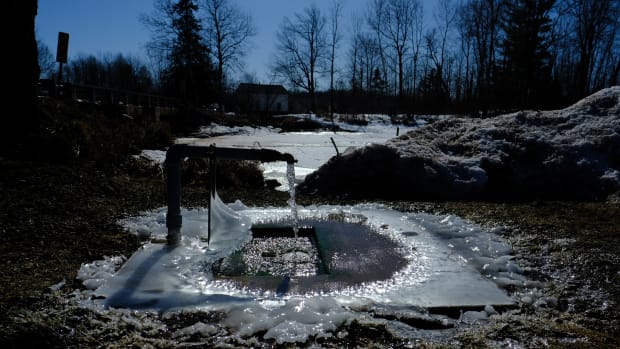
50 years ago: Firth twins begin Olympic career
Miles Morrisseau
Special to Indian Country Today
Just before midnight on New Year's Eve 1953, the Firth twins were born under the Northern Lights in Canada’s far north, where the Mackenzie River Delta drains into the Beaufort Sea and the Arctic Ocean.
Shirley and Sharon Anne Firth were born on the land in Aklavik in the Northwest Territories and would be raised off the land in a log cabin, by a Gwich’in Dene mother and a Métis father.
It wasn’t a typical start for future four-time Olympians, but it’s where they developed a competitive spirit and fascination with cross-country skiing. The sisters would race across the lands as children looking for rabbits caught in their snares.
SUPPORT INDIGENOUS JOURNALISM. CONTRIBUTE TODAY.
Then they participated in a program funded by the government to identify and encourage participation in Winter Olympic sports. Although they had never heard of cross-country skiing, let alone had any experience in the sport, the Firth twins proved to be world class.
“We put on our first pair of skis when we were 12 years old, and for cross-country skiing that’s late in life,” Sharon Anne told Indian Country Today by phone from her home in Yellowknife in Canada’s Northwest Territories.
“Most of these athletes start skiing as soon as they can walk,’” she said. “But that didn't stop us. That was okay. It was fun and new and exciting and got us doing something that we immediately fell in love with.”

Cross-country skier and the first Indigenous woman believed to have represented Canada at the Winter Olympics, Sharon Firth stands at the podium during a ceremony on April 22, 2015, when she and her twin sister, Shirley, were named to the Canada Sports Hall of Fame. Sharon Firth remains active in promoting sports in Canada; Shirley died in 2013. (Photo by Chris Young/The Canadian Press via AP)
That love for the game led them to four Winter Olympics starting with the 1972 games in Sapporo, Japan, when the twins were only 18.
They competed again for Canada in the 1976 games in Innsbruck, Austria, followed by the 1980 games in Lake Placid, New York, and finally the 1984 games in Sarajevo, in the former Yugoslavia. In their stellar career, the Firth twins were members of the Canadian national team for an unprecedented 17 years, winning a combined 48 national titles.
Although they never won medals at the Olympics, they broke ground for Canada in a sport long dominated by Scandinavians.
Shirley died on April 30, 2013. She would be inducted posthumously along with Sharon Anne into the Canada Sports Hall of Fame in 2015. The sisters were the first Indigenous women inducted into the hall.
Christine O'Bonsawin, associate professor of history and Indigenous studies at the University of Victoria, wrote her master’s thesis on the Firth twins more than 20 years ago.
Her research taught her “how incredible their feats were, not only on the national level, but also on the international circuit,” she said.
She said Canada had participated in cross-country skiing since the 1800s but had little success.
“Canada hadn't really achieved much in Nordic sport,” she said. “So they really put Canada on the map, in terms of cross-country skiing.”
A world stage
In the beginning, Sharon Anne did not have any idea where it would all lead.
“We actually started through a program for Indigenous youth,” she said. “And the program was called Territorial Experimental Ski Training (TEST) program. And it was funded by the territorial government and the federal government to see if Indigenous people could excel in international sport. But at that time, we didn't know that or what it was all about.”
Read More
For their entire Olympic and international competitive careers, the Firth sisters pushed each other to keep getting better. When asked what role her twin played in maintaining her competitive spirit for all those competitions, Sharon Ann said it was simple.
“That role was to beat her – I think it was probably the same for her,” she said.

Canadian twins Sharon and Shirley Firth, Gwich’in Dene and Métis, shown here in an undated photo believed to be from the Olympics in the 1970s or 1980s, are credited with making Canada a force in Nordic skiing. (Photo courtesy of Nordiq Canada)
Not long after strapping on a pair of skies for the first time, however, the Dene twins were representing Canada in international competitions.
“Our first big major competitions were in Fairbanks and Anchorage, Alaska,” she said. “We were skiing against their national team, but we weren't even on the national team. We were a club team. And we beat the American racers. So then, you know, the next step is the Canadian championships, the North American championships. We were so young and we just loved the travel and meeting new people and representing our own people and doing this on a world stage.”
The twins made their national debut competing in the Canadian Junior Cross Country Championships in Port Arthur, Ontario, in 1968 when they were only 14. Shirley took silver and Sharon Anne was right behind her to claim the bronze in the 5-kilometer race.
The next year they made their international debut in Sweden. Sharon Anne took the gold and Shirley took the silver – the first junior victory by a Canadian in a European cross-country race. At the 1969 Canadian Junior Cross Country Championships, Shirley won gold in the 5 km race and Sharon Ann would take the silver, and they would both claim gold in the 3x5 kilometer relay race.
The 11th Winter Olympics in 1972 were the first games hosted by Japan, which had been set to host the games in 1940 until they were canceled because of World War II. The 1972 games were also memorably boycotted by Canadian hockey, whose request to send players from the National Hockey League to compete was overruled by the Olympic committee, which held firm to its philosophy at the time of accepting only amateurs.
Sharon Anne finished 26th at those first 1972 games, which remained a Canadian record until the 5 km race was taken out of Olympic cross-country competition in 1998.
“Being on that world stage, it really wasn’t about us anymore,” she said. “It was that big representation of Indigenous people all across the country. You know, we can do it. Hopefully, they can do that, too.”
Enduring legacy
The twins’ record of representing their country was unmatched at international competitions for more than 25 years until snowboarding was introduced and Jasey Jay Anderson began a six-time run in the Winter Olympics.
But their accomplishments are well-lauded across Canada.
In addition to their induction into the Canada Sports Hall of Fame as the first Indigenous women, the sisters were named in 1987 as members of the Order of Canada, the nation’s highest civilian honor; inducted into the Canadian Ski Hall of Fame and Museum in 1990; inducted into the Northwest Territories Sport Hall of Fame in 2012; and honored with the Queen’s Golden Jubilee Medal in 2002.
An award was set up in their honor, the Shirley and Sharon Anne Firth Award, by Nordique Canada, a national organization that promotes skiing both downhill and cross-country for all Canadians as recreation and promotes athletic excellence. Created in 1985, the award honors the top Canadian athletes in the sport.
In 2020, the sisters’ story was immortalized in animation in the hit children's television series, “Molly of Denali,” in which Sharon Anne made an animated appearance.
In the years since her retirement from competition, Sharon Anne has continued to inspire youth and share her messages of healthy living and hard work as the youth program advisor for the government of the Northwest Territories.
“It takes a lifetime to be good at anything,” she said. “So if you're going to get into sports, or whatever your desire is, it doesn't happen overnight … The thing is, to keep it fun. Yeah, and just get out there and practice. Wake up in the morning and show up.”
She wants to share her belief in the power of sports to help build a better world.
“It creates partnerships all over the world and your own little community and then you can bring it back and show your people what you've done,” she said. “And try to encourage them to do their best at whatever they choose to do in life.”
Our stories are worth telling. Our stories are worth sharing. Our stories are worth your support. Contribute $5 or $10 today to help Indian Country Today carry out its critical mission. Sign up for ICT’s free newsletter.












